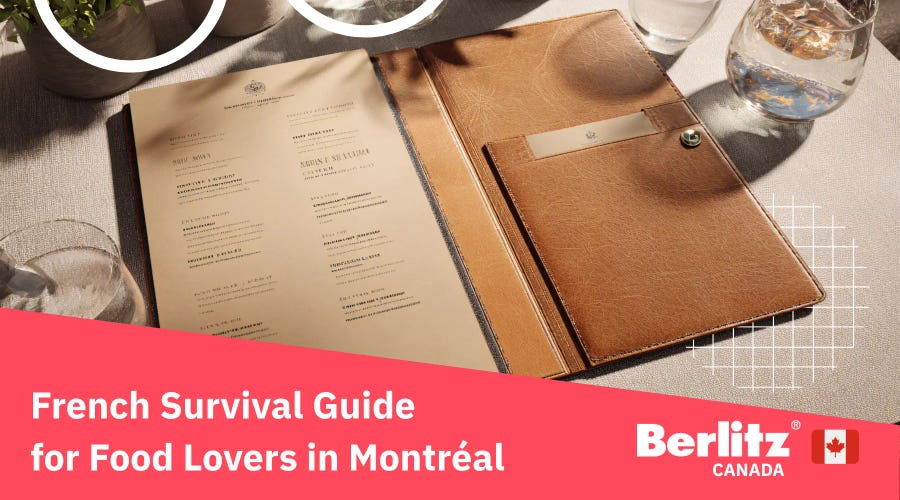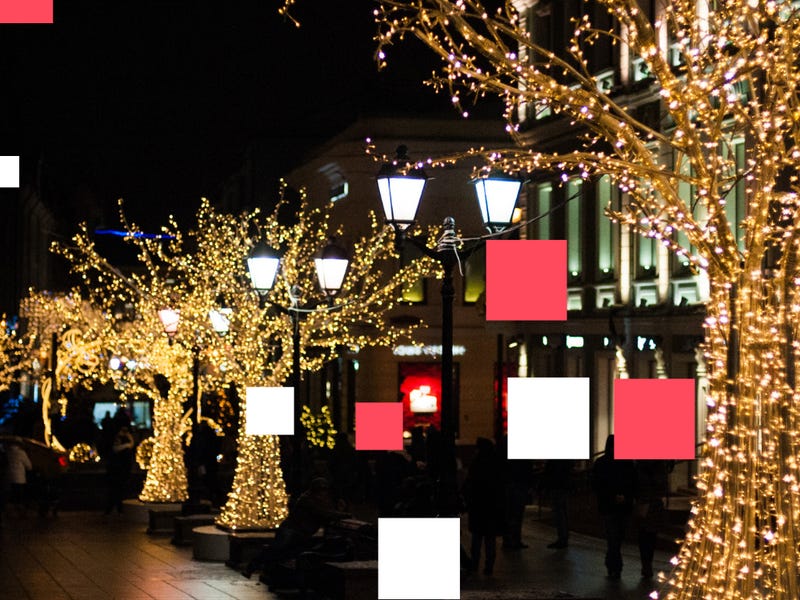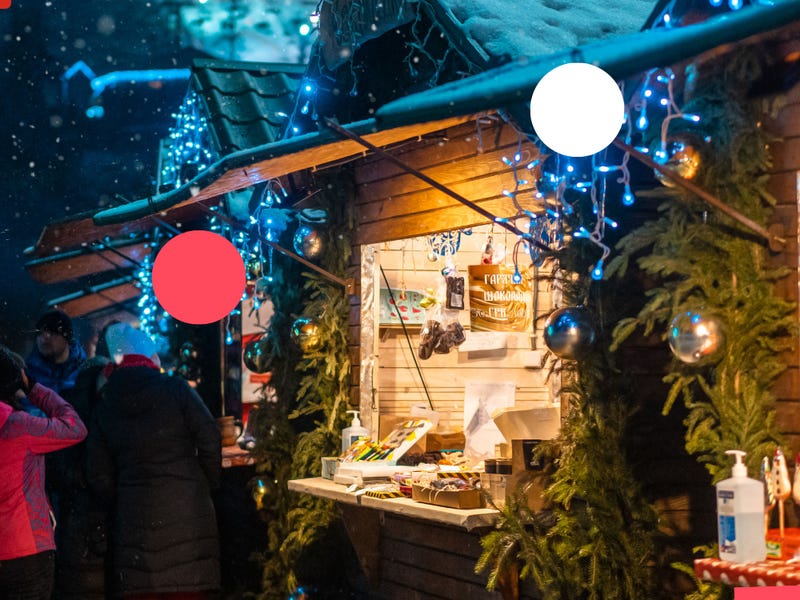
French Survival Guide for Food Lovers in Montréal
Author:
Berlitz
Montréal's food scene is world-class.
From the aromatic chaos of Jean-Talon Market to that tiny bistro in the Plateau that locals guard like a secret, this city offers culinary experiences that rival anywhere in the world.
But here's the thing: to truly enjoy it—to get the chef's recommendation, understand the daily special, or banter with your server—you need more than English.
French is the language of Montréal's service industry, especially in the neighbourhood spots where the magic happens.
Table of Contents
- The Real Challenge
- A. Making Reservations & Arrival (5 Phrases)
- B. Ordering & Decoding the Menu (10 Phrases)
- C. Requesting & Dealing with Service (5 Phrases)
- D. Paying & Departure (5 Phrases)
- Where to Practice: Turning Montréal Into Your Language Lab
- From Survival French to Conversational Fluency
The Real Challenge
Most visitors and newcomers learn a few basic phrases before arriving. Bonjour. Merci. Au revoir.
Then they sit down at a restaurant, face a detailed menu in rapid-fire joual (Québécois dialect), and freeze.
The server asks a question. You catch maybe three words. You panic and point at something on the menu, hoping it's not the weirdest thing available.
Sound familiar?
This guide gives you the 25 essential French phrases you need to navigate any dining experience in Montréal—and turn every meal into a practical language lesson.
And while these phrases will get you through the door, Berlitz French courses give you the confidence to actually converse with the chef, debate wine pairings with the sommelier, and leave a restaurant feeling like you genuinely connected with the experience.
A. Making Reservations & Arrival (5 Phrases)
The Essentials
1. "Bonjour, j'ai une réservation au nom de [your name]." Hello, I have a reservation under the name of [your name].
2. "Nous sommes trois personnes." We are three people.
3. "Est-ce qu'on peut avoir une table près de la fenêtre ?" Can we have a table near the window?
4. "À quelle heure fermez-vous ?" What time do you close?
5. "Y a-t-il une liste d'attente ?" Is there a wait list?
Why This Matters
First impressions count. Clear pronunciation here sets the tone for the entire meal.
If you struggle with phone reservations or greeting the host, Berlitz private lessons can focus specifically on these high-stakes moments, drilling pronunciation until it feels natural.
B. Ordering & Decoding the Menu (10 Phrases)
The Core Questions
6. "Qu'est-ce que vous recommandez ?" What do you recommend?
7. "C'est quoi, le plat du jour ?" What's the dish of the day?
8. "Qu'est-ce qu'il y a dedans ?" What's in it?
9. "Comment c'est préparé ?" How is it prepared?
10. "C'est épicé ?" Is it spicy?
Dietary Needs & Restrictions
11. "Je suis allergique aux noix." I'm allergic to nuts.
12. "Je suis végétarien(ne)." I'm vegetarian.
13. "Sans gluten, s'il vous plaît." Gluten-free, please.
Making Your Choice
14. "Je vais prendre le [dish name]." I'll have the [dish name].
15. "Est-ce que je peux avoir ça sans [ingredient] ?" Can I have that without [ingredient]?
Québécois Menu Vocabulary to Know
-
Dîner = Lunch (not dinner!)
-
Souper = Dinner
-
Entrée = Appetizer (not main course)
-
Plat principal = Main course
-
Breuvage = Beverage (very Québécois)
Understanding these distinctions prevents confusion. This is exactly the kind of tailored, practical vocabulary that Berlitz courses emphasize—you learn what you'll actually use, not textbook French that doesn't match the street.

C. Requesting & Dealing with Service (5 Phrases)
During the Meal
16. "Puis-je avoir la carte des vins ?" May I have the wine list?
17. "C'est délicieux !" It's delicious!
18. "Il me faudrait un autre [item]." I need another [item].
19. "Pouvez-vous m'apporter [something] ?" Can you bring me [something]?
20. "Ça va bien, merci." Everything's good, thank you.
The Politeness Factor
Notice the use of puis-je and pouvez-vous rather than je veux (I want).
French—especially in Montréal service contexts—values politeness and formality. Using the right register makes servers more helpful and creates better interactions.
This cultural appropriateness is core to the Berlitz Method®, which doesn't just teach you words—it teaches you how to use them in real social contexts.
D. Paying & Departure (5 Phrases)
Wrapping Up
21. "L'addition, s'il vous plaît." The bill, please.
22. "Acceptez-vous la carte de crédit ?" Do you accept credit cards?
23. "Est-ce que le service est inclus ?" Is the tip included?
24. "Gardez la monnaie." Keep the change.
25. "Merci beaucoup, c'était excellent !" Thank you very much, it was excellent!
The Tipping Context in Quebec
In Quebec, tipping (le pourboire) is expected—usually 15-20% before tax.
Unlike some countries, service is rarely included in the bill. Being comfortable with numbers and percentages in French makes this moment less stressful.
Berlitz intensive courses build numerical fluency through practical scenarios exactly like this—calculating tips, discussing prices, negotiating bills.
Where to Practice: Turning Montréal Into Your Language Lab
MTLàTABLE: The Perfect Practice Ground
MTLàTABLE (typically held in November) is Montréal's beloved fixed-price restaurant week.
High-end restaurants offer limited menus at accessible prices, which means less decision paralysis and more focus on the interaction itself.
It's a high-volume, low-stress environment to practice these phrases.
Pro tip: Don't just order and eat. Ask follow-up questions. "Quelle est l'inspiration du chef pour ce plat ?" (What inspired the chef for this dish?) Push yourself beyond survival phrases and into actual conversation.
Jean-Talon Market & Atwater Market
The public markets are exceptional for practicing French with vendors.
You'll work on numbers (une livre, un kilo), produce vocabulary (tomates, courgettes, fromage), and quick transactional French.
Bonus: Vendors at these markets are often French-only, so you'll get genuine immersion without the safety net of English.
Local Boulangeries (Bakeries)
Simple, fast transactions that force you to be quick with your French.
"Une baguette et deux croissants, s'il vous plaît."
No time to overthink. Just speak.
Food Festivals & Terroir Events
Any event celebrating Québec products or regional cuisine offers practice opportunities.
Look for events featuring local producers, wine tastings, or chef demonstrations—all typically conducted in French.
From Survival French to Conversational Fluency
Every meal in Montréal is an opportunity to improve your French.
Use these phrases. Be brave. Embrace the occasional stumble—it's how you learn.
But here's the reality: survival phrases get you through the door. Real fluency—the kind that lets you joke with your server, debate which wine pairs better with duck confit, or ask the baker about her grandmother's recipe—requires structure and practice.
That's where Berlitz Montréal comes in.
Our native-fluent instructors don't just teach you vocabulary. They prepare you for real conversations in real contexts. Whether you're ordering at a Michelin-starred restaurant or haggling at the market, you'll have the confidence to engage fully.
Ready to Move Beyond "L'addition, s'il vous plaît"?
Visit Berlitz Canada to learn more about our French programs designed specifically for Montréal's unique linguistic landscape.


.png?auto=webp&format=pjpg&quality=80&width=800&height=800&fit=crop&crop=800:600,smart)